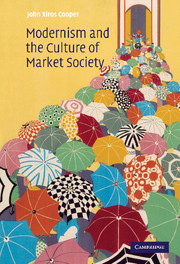Book contents
- Frontmatter
- Contents
- Acknowledgements
- Introduction The modernist avant-garde and the culture of market society
- PART I THE POSTHUMAN SCENE
- PART II THE REGIME OF UNREST: FOUR PRECURSORS
- PART III THE MARGIN IS THE MAINSTREAM
- 9 Artisanal production, Ulysses, and the circulation of goods
- 10 History and the postpsychological self in The Waste Land
- 11 La bohème: Lewis, Stein, Barnes
- 12 Bloomsbury nation
- Notes
- Bibliography
- Index
9 - Artisanal production, Ulysses, and the circulation of goods
Published online by Cambridge University Press: 22 September 2009
- Frontmatter
- Contents
- Acknowledgements
- Introduction The modernist avant-garde and the culture of market society
- PART I THE POSTHUMAN SCENE
- PART II THE REGIME OF UNREST: FOUR PRECURSORS
- PART III THE MARGIN IS THE MAINSTREAM
- 9 Artisanal production, Ulysses, and the circulation of goods
- 10 History and the postpsychological self in The Waste Land
- 11 La bohème: Lewis, Stein, Barnes
- 12 Bloomsbury nation
- Notes
- Bibliography
- Index
Summary
Louis Bonaparte, Frédéric Moreau, Heathcliff, Catherine, and Alice comprise a characterology for modern times (cf. Benjamin's “series of types” in Arcades, 338). They will migrate from the nineteenth century into the twentieth and delimit a whole range of familiar personalities, from slacker to gangster, from lover to sell-out, from the entrepreneur to flower child. To this set of characters one must also add Marx's narrator in Eighteenth Brumaire. In his case, we see scientific or rational man confronted by a reality that does not deliver the sense that is expected of it. The rationalist will, in turn, be transformed into a number of specific modern subtypes. One is the bureaucrat, a functional agent of that basic Enlightenment rationalism that posits the external world as fundamentally vulnerable to the operations of human reason. All problems, events, and persons, therefore, can be assigned their proper categories for solution. There is nothing more frustrating for this personality-type than that some particular thing resist its proper appointment. Early modernist writers, especially on the continent, were particularly sensitive to the sudden appearance of categorical anomalies within the rationalized state. Franz Kafka's “Metamorphosis,” for example, allegorizes this kind of system puzzle, as does the mysterious process in The Trial. In traditional, premodern society categorical elegance depends on God. Market-driven modernity cuts the heavenly connection and dislodges the categories.
- Type
- Chapter
- Information
- Modernism and the Culture of Market Society , pp. 163 - 193Publisher: Cambridge University PressPrint publication year: 2004

